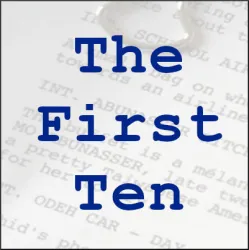
How important are the first ten pages of your screenplay?
by Ben Cahan
Article, 4 pages
Viewed by: 7 Residents and 201 Guests
We hope you enjoy the article!
If you are a screenwriter looking to network, learn more about the craft or get feedback and exposure for your own projects,
Click Here to become a Talentville Resident and join our growing community of screenwriters and Industry professionals.

by Ben Cahan
It is often said that Hollywood readers make up their minds about a screenplay’s worth after the first ten pages, if not sooner. I’ve even heard from numerous Industry friends that they know the deal after a page or two. That can be very frustrating for aspiring writers, who feel that if the reader would just keep reading, they would ultimately see the whole story and want to recommend it. Heck, the first ten pages often don’t even get to the inciting incident (which often happens between pages 15-20), so what conclusions can anyone really make that soon into the screenplay?
As it turns out, plenty.
For me, when reading a script for consideration or coverage, there are a few things I look for in the early pages as I begin to form an opinion about the script as a whole. I am not concerned with the larger story so much, I will get there, I am more curious as to whether I am going to have a pleasant time reading the script or if it is going to be a slog.
So, here are a few of the things I look for in the opening pages of a script, things that can either have me feeling pumped to read on (good!) or warning signs that elicit groans and head-shakes (not so good?):
Is the formatting Industry-standard?

This should be brainless. Most screenwriters with any knowledge understand the expected layout of a script, from scene headings to character names, parentheticals and scene transitions. This expected format will be automatic for anyone using one of the many scriptwriting apps or software out there, just be sure this very simple requirement is checked off.
Is the action concise, visual and clear?

Remember, a screenplay is not a novel, and long blocks of action tend to make readers’ eyes glaze over. Nobody really likes to spend too much time reading action, and most of us are able to fill in the larger picture from spare but clear descriptions.
Of course, there are times when lots of things are going on, like in set pieces or fight scenes, or montages meant to show a series of scenes. Even there, however, be concise, be clear, tell us what is going on in a way we can visualize, in a way where our minds can envision the scene on the movie screen of our mind. This even goes to character introductions, where we likely want an age range, an adjective or two, but perhaps not that they are worn down from years of rejection or neglect. Leave that stuff to the produced writers who have earned the right to wax on.
Also, indicating state-of-mind references in a scene, such as the rationale for a character doing something, or explaining what they are thinking, tends to be a negative as they are not directly filmable actions. We don’t need to be told why something is happening, we readers are smart enough to infer feelings and motivations and thoughts from what the characters do. A sharp look, a hand slap to the forehead, even a warm smile or kiss, these things are clear actions that usually have meaning behind them, meaning we understand. A woman lying in bed crying says plenty even if we don’t immediately know why. Actions, not feelings.
Is the dialogue natural and clever?

Dialogue is one of the toughest skills a screenwriter acquires over time, and readers I know allow an unproduced writer a bit of leeway since it can be tweaked and polished if the story merits development. However, dialogue that screams ‘cliché’, or is too obvious or direct or is otherwise completely forgettable is not going to score you any points with the reader.
We want the zinger, we want to see a character saying one thing but which we know really means something different, we want to see that the writer is creative and unpredictable with their dialogue. If the dialogue is always what we expect, it gets boring. If characters always answer questions simply and directly, it tends to feel forced and unnatural. Remember, the characters each have their own perspectives and background, history and personality, make those shine through in the dialogue and you will find readers becoming invested in what happens to them.
One suggestion is to go through your scripts and sprinkle in as many unexpected gems in dialogue as you can, to keep us on our toes as we read your script. Have them go off on a tangent, not directly answer a question, make an ironic observation, anything that shows your creativity as a writer.
Is there enough story to get me intrigued?
The first ten pages of a script usually won’t get too far into the underlying story, but they should set up the main characters, the world they live in, and the problems they face that will play out in the script. Any insight into the psyche of the main characters, things that might get an audience to be able to relate to, empathize with, or even hate them are good things to include, even if shown briefly in ways that make us want to know more.
Does the story feel original?
This is an offshoot of the last point, just remember that readers love to see stories they haven’t seen before. The ‘same but different’ saying is fine as long as we remember the word ‘different’. It is just fine if the early setup feels familiar to us, just be sure there is something new you have added to the tried and true, something that shows this script is not just a paint by numbers version of so many other scripts we have read.
The thing to keep in mind is that readers read lots of scripts, and by the very nature of the job many scripts will feel the same, becoming forgettable or at least not distinguishable from similar projects. What is going to make your script stand out in the early pages?
To Sum Up…
The first ten pages of your screenplay are pages you should focus on because like many things in life, first impressions are important impressions. We want to know you can write clear, concise and visual action, we want to know you can write dialogue that sounds like actual people talking, we want to know you have spell-checked the script and formatted it properly and avoided any obvious blunders that would tell us you didn’t put in 100% effort.
I will grant, the first ten pages can often be a bit misleading, with only a glimpse of the characters, the world and the underlying plot. Only by reading the entire script will a reader know if the story is clever enough and the situation creative enough and the stakes dramatic enough to recommend a script. However, the early pages will often set the tone and frame the expectations of a reader, and the last thing any writer wants is a reader abandoning the script in the first act.
-- Ben Cahan




Comments on How important are the first ten pages of your screenplay?